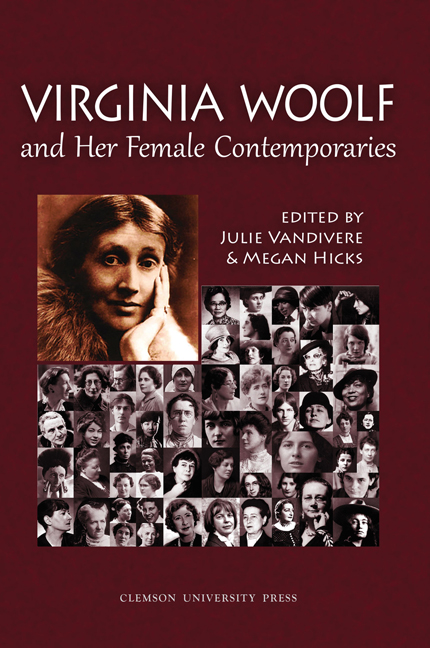Book contents
- Frontmatter
- Table of Contents
- Introduction
- Acknowledgments
- Abbreviations
- Who Are Virginia Woolf's Female Contemporaries?
- Virginia Woolf's Cultural Contexts
- Virginia Woolf and the Book Society Limited
- The Outsider as Editor: Three Guineas and the Feminist Periodical
- Woolf 's Imperialist Cousins: Missionary Vocations of Dorothea and Rosamond Stephen
- Mary Sheepshanks, Virginia Stephen, and Morley College: Learning to Teach, Learning to Write
- Moving Picture This: Virginia Woolf in the British Good Housekeeping!? or Moving Picture This: Woolf 's London Essays and the Cinema
- “Quota Quickies Threaten Audience Intelligence Levels!”: The Power of the Screen in Virginia Woolf 's “The Cinema” and “Middlebrow” and Betty Miller's Farewell Leicester Square
- Virginia Woolf's Contemporaries Abroad
- Virginia Woolf's Contemporaries at Home
- Tribute to Jane Marcus
- Notes on Contributors
- Conference Program 223
The Outsider as Editor: Three Guineas and the Feminist Periodical
from Virginia Woolf's Cultural Contexts
- Frontmatter
- Table of Contents
- Introduction
- Acknowledgments
- Abbreviations
- Who Are Virginia Woolf's Female Contemporaries?
- Virginia Woolf's Cultural Contexts
- Virginia Woolf and the Book Society Limited
- The Outsider as Editor: Three Guineas and the Feminist Periodical
- Woolf 's Imperialist Cousins: Missionary Vocations of Dorothea and Rosamond Stephen
- Mary Sheepshanks, Virginia Stephen, and Morley College: Learning to Teach, Learning to Write
- Moving Picture This: Virginia Woolf in the British Good Housekeeping!? or Moving Picture This: Woolf 's London Essays and the Cinema
- “Quota Quickies Threaten Audience Intelligence Levels!”: The Power of the Screen in Virginia Woolf 's “The Cinema” and “Middlebrow” and Betty Miller's Farewell Leicester Square
- Virginia Woolf's Contemporaries Abroad
- Virginia Woolf's Contemporaries at Home
- Tribute to Jane Marcus
- Notes on Contributors
- Conference Program 223
Summary
On February 7, 1938, Virginia Woolf wrote in her diary about a walk through the Sussex countryside:
I was very happy: relieved of my book; & tossing ideas as I walked over the downs. For instance: an illustrated sheet to be called The Outsider: a barrel organ tune about The Shrivelled Thorn Furze tree on the downs, through which I see the bungalows: rhymed burlesque. A good idea. But I must do the notes to 3 Gs first. (D5: 128)
Woolf was in the final stages of her work on Three Guineas (1938), always a fraught time for her in the process of publication. This walk appears to have come as a welcome relief, a chance for her mind to wander freely after the focused mental work of writing and proofing. Consequently, it is hard to paint the ideas she records from this walk as anything other than flights of fancy. In spite of that, I propose that we take seriously the first idea she records in this entry, the “illustrated sheet to be called The Outsider,” and argue that this imagined Outsider paper reveals an association that is neither casual nor accidental between the figure of the Outsider and the periodical press.
That the workings of the press should have been on Woolf 's mind at this time is not surprising: as she mentions in the passage above, she was working on the notes to Three Guineas, which drew extensively on her scrapbooks of newspaper clippings. While she reminded herself of the problems and failings of the extant press, it makes sense that her mind would turn, if only in fancy, to reform. In her later correspondence with Lady Margaret Rhondda, the editor of the feminist weekly Time and Tide, Woolf wonders “if we could really do anything with the outsider idea?” (L6: 229) While this comment has most often been taken as a reference to a future non-society society or non-movement movement, I want to consider the possibility that this “anything” might be a periodical. In this paper, I argue that in Three Guineas Woolf constructs what amounts to a model for feminist periodical publication, exploring the relationship between a writer and her audience as she investigates the relationship between women and their society, culture, and nation.
- Type
- Chapter
- Information
- Virginia Woolf and Her Female Contemporaries , pp. 56 - 61Publisher: Liverpool University PressPrint publication year: 2016



